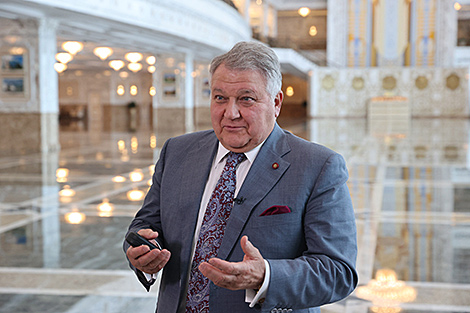Events
Plans for joint research infrastructure in Belarus-Russia Union State

MINSK, 27 July (BelTA) – Belarus and Russia intend to create a joint research infrastructure of the Union State of Belarus and Russia. The proposal was discussed as Belarus President Aleksandr Lukashenko met with President of the national research center Kurchatov Institute Mikhail Kovalchuk on 27 July. The proposal was backed by both sides, BelTA learned from the Kurchatov Institute president after the meeting.
Mikhail Kovalchuk said: “It is our joint proposal with the president of the Academy of Sciences to set up a joint research infrastructure of the Union State of Belarus and Russia. Thus, Belarusian scientists will get access to the entire infrastructure that is being deployed now and will become the world’s best within the next five years.”
The scientist explained that complicated and expensive complexes – megascience facilities – will be used. They represent the foundation for scientific breakthroughs in materials science, biology, healthcare, agriculture, and other spheres today. Two programs have been launched in Russia in this sphere. The Kurchatov Institute has been chosen to be the head organization.
Back in the Soviet times Russia’s potential in the area of megascience was one of the world’s top. After the USSR collapse the megascience specialists were sought in many countries across the globe. Megascience installations were commissioned in a number of European countries thanks to their work. “We made only an intellectual contribution initially, we were employed. Then we started supplying technologies. Today we are a major donor. After paying billions of euros we are co-owners of these installations,” Mikhail Kovalchuk said. He pointed out that Belarusian scientists can get access to megascience installations. In turn, Russian scientists will get an opportunity to use manufacturing capabilities of Belarusian enterprises.
In his words, Aleksandr Lukashenko and Mikhail Kovalchuk also discussed the advancement of cooperation in the area of nuclear technologies. In particular, the establishment of a Belarusian branch of the Moscow Engineering Physics Institute (MEPhI) was mentioned. The institute was initially established to train engineers and scientists for the nuclear industry. “I think the possibility of opening a MEPhI branch here in addition to the Kurchatov Institute’s branch, which already operates at premises of the [Belarusian nuclear power] plant, will give a new impulse to our cooperation in the area of nuclear technologies,” Mikhail Kovalchuk stressed.
The scientist praised Belarus’ decision to build a nuclear power plant of its own because he believes nuclear energy to be the only absolutely environmentally pristine source of energy. Scientists are already working on the safe usage of spent nuclear fuel and an effective solution will be found soon, he is convinced. “If we invent and organize the entire fuel cycle to make this waste disappear, then the problem will be resolved,” he said.
A pilot project to build a fast-neutron reactor has been launched in Seversk, Tomsk Oblast, Russia. Its implementation will allow creating green nuclear energy in the next few years. “We are actually ready to make this our common business. We’ve talked about it with Aleksandr Grigoryevich [Lukashenko]. We are launching nuclear project 2.0,” the scientist said. “Energy security is its key goal”. Digitization is now part and parcel of people’s lives. It greatly polarizes the world and requires considerable energy costs. “According to the OSCE, at present 30% of the world’s energy is spent on operating the networks – Wi-Fi, Internet, and so on – without industrial manufacturing. Generating energy in a pure form and in sufficient amounts is a guarantee of sustainable development and security,” he noted.
Continuing the line of thought, Mikhail Kovalchuk mentioned the Ignalina nuclear power plant. He said Lithuania’s decision to shut down the Ignalina nuclear power plant was an error. The country had been pressured into making the decision. In his opinion, Lithuania could live like Saudi Arabia by selling electricity in its region. “Stupidity and emotions cannot guide the accomplishment of important state tasks. They could sit idle and sell electricity to you. Instead they shut down the nuclear power plant and in essence shut down the country,” the Kurchatov Institute president believes.







 print version
print version make home page
make home page add to bookmarks
add to bookmarks

